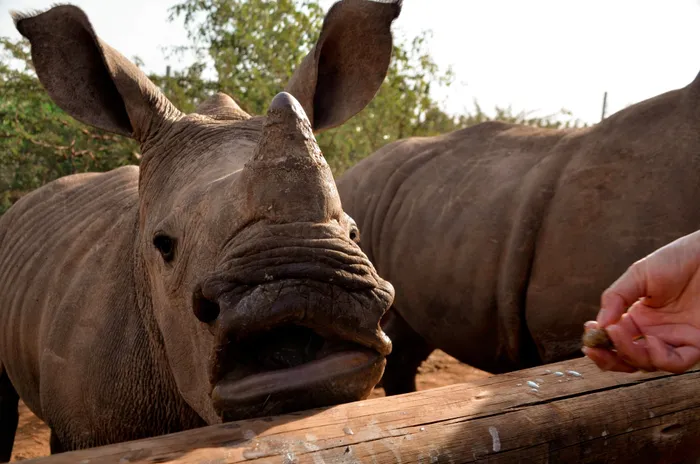PICS: Dehorning proves effective in Hluhluwe-iMfolozi Park as rhino poaching plummets

One of the rescued rhino orphans. | Zululand Rhino Orphanage
Durban — Dehorning has resulted in an 80% drop in poaching in the Hluhluwe-iMfolozi Park (HiP) in KwaZulu-Natal, however, criminal syndicates continue to look for weak spots.
That was according to the World Wide Fund For Nature (WWF) which said the mass dehorning of rhinos in HiP this year resulted in an 80% drop in poaching in the park since the operation began in April.
The WWF explained that the ongoing Ezemvelo KZN Wildlife dehorning operation is a strategic partnership between the provincial conservation agency and the WWF, with additional support from Wildlife ACT, Save the Rhino International and Zululand Wildlife Vets.
To date, the dehorning has spared the lives of an estimated 120 rhinos and enabled the rescue of eight orphaned calves whose mothers had been killed. The calves were found in the early days of the operation when poaching levels were still high and are now being cared for at the Zululand Rhino Orphanage.

“Unfortunately, rhino poachers are indiscriminate and often target female rhinos that have small calves at foot. These calves are usually ignored by the poachers and are left behind to fend for themselves. Fortunately, for these eight calves, due to the extensive aerial surveillance carried out during the dehorning operation, they were discovered in time,” explained WWF South Africa’s Rhino Conservation Programme manager Jeff Cooke.
Cooke further explained that the emergency dehorning operation in HiP was in response to the extremely high poaching pressure this iconic KZN park has been under.
HiP is known as the birthplace of white and black rhinos in South Africa as it provided animals that repopulated other reserves where they had been wiped out.
In 2023, some 307 rhinos were killed in HiP alone, representing more than 10% of the park’s population and some 60% of the national poaching loss in South Africa.
However, once dehorning commenced, poaching figures dropped dramatically to single-digit figures.
In June only four animals were lost, in July eight and four in August. When the operation first started in April, around 30 animals a month were being killed. To date, more than a thousand rhinos have been dehorned as part of the ongoing operation.

Cooke said that alongside the dehorning, the security capacity of HiP has steadily improved with more security cameras, “smart fences” and the use of tracking and detection dogs being deployed. Many of the dehorned rhinos have also been fitted with tracking pods to allow for the remote monitoring of their movements.
Another spin-off of the enormous dehorning operation has been an unprecedented opportunity to gather data for scientific research into rhino genetics, diet and population demographics. This data will be a rich source of information that will continue to deliver results in the years to come.
“We commend the hard work and dedication of the large number of people involved in the ongoing dehorning operation in HiP. While we have seen a dramatic decline in poaching in this iconic park, we cannot let our guard down. We know that the criminal syndicates are always looking to capitalise on security lapses wherever they can find them,” Cooke said.

Adding a voice, Hill’s Pet Nutrition senior Veterinary Affairs manager Dr Guy Fyvie said: “Rangers across South Africa, supported by K9 anti-poaching units, have been instrumental in tracking and apprehending poachers.”
Manyoni Private Game Reserve’s K9 Unit in KZN, one of the many K9 Units around the country sponsored by Hill’s, successfully apprehended six poachers in 2023, with no rhinos lost to poaching on the reserve.

The significance of these efforts is highlighted through Hill’s Making Contact series.
“It not only recognises the remarkable role these dogs play in protecting our natural heritage but also their incredible handlers who, through their commitment to working with the dogs, are making a real difference in the fight against poaching,” Fyvie said.
He added that there are substantial costs involved with training, feeding, and looking after the health of the K9 unit dogs and Hill’s has proudly been sponsoring the units with food, equipment, and healthcare for the last decade.

In August, the Department of Forestry, Fisheries and the Environment Minister Dr Dion George revealed that during the first six months of 2024, 229 rhinos were poached in South Africa (compared to 231 for the same reporting period in 2023). Of those rhino poached, 191 were killed on state properties and 38 on privately owned parks, reserves or farms.
At the time, he said a significant drop was noted during May and June this year with national losses reported at 21 and 22 respectively (May and June of 2023 were recorded at 42 and 34). This reduced loss is thought to be attributable to the dehorning of rhino populations in KZN and specifically in HiP where over 1 000 rhinos were dehorned since April 2024.
Sunday, September 22, marks World Rhino Day.

WhatsApp your views on this story at 071 485 7995.
Daily News
Related Topics: